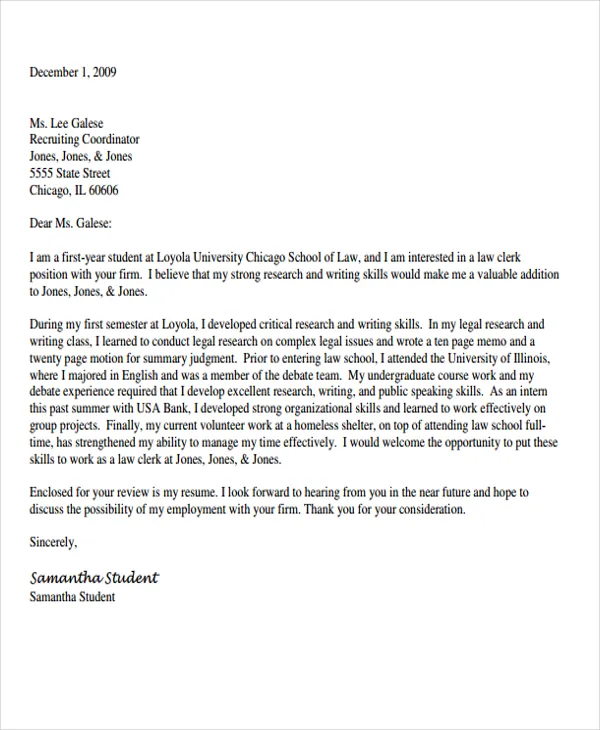What is a Law School Cover Letter
A law school cover letter is a crucial component of your application package, serving as your initial introduction to the admissions committee. It’s your opportunity to go beyond the information presented in your resume and transcripts, allowing you to showcase your personality, motivations, and unique qualifications. Think of it as your personal statement’s shorter, more focused sibling, designed to highlight why you’re a strong candidate and why you’re specifically interested in attending their law school. This letter provides a platform to articulate your aspirations, explain any inconsistencies in your application, and demonstrate your understanding of the legal field and the school’s specific offerings. Its primary function is to persuade the admissions committee that you are not just qualified, but also a great fit for their program and community. Many candidates often overlook the importance of the cover letter, but it’s a vital piece that could be the deciding factor in your acceptance, demonstrating your writing ability and commitment to law.
Why is a Cover Letter Important
A well-crafted cover letter is important for several reasons. Firstly, it allows you to personalize your application and connect with the admissions committee on a more individual level. Law school applications often involve numerous candidates with similar academic qualifications; a cover letter allows you to stand out. Secondly, it provides an opportunity to clarify any weaknesses in your application, such as a lower-than-average GPA or gaps in your work history. By addressing these issues directly, you demonstrate transparency and a proactive approach to potential concerns. Furthermore, it demonstrates your writing skills, a critical attribute for any aspiring lawyer. A cover letter showcases your ability to communicate effectively, structure your thoughts coherently, and express yourself persuasively. Lastly, the cover letter indicates your genuine interest in the law school itself. It allows you to explain why you’re drawn to their specific programs, faculty, and resources. Your application gains significant value when you demonstrate that you have taken the time to research the school and how your goals align with their offerings.
Tip 1 Research the Law School
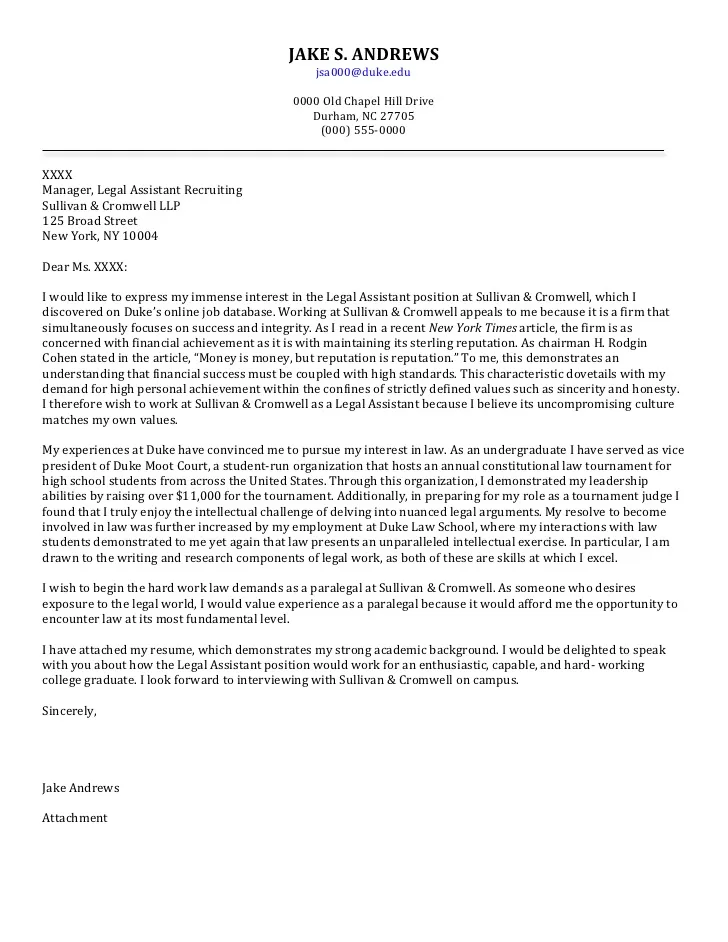
Before you even begin drafting your cover letter, thorough research of the law school is essential. Familiarize yourself with the school’s mission, values, and specific areas of expertise. Explore their faculty profiles, paying attention to professors whose research aligns with your interests. Investigate the school’s clinics, centers, and extracurricular activities to determine if they align with your career aspirations. Visit the school’s website, read student blogs, and consider attending virtual or in-person information sessions. This research will not only give you a deeper understanding of the institution but also provide specific details to incorporate into your cover letter. When you mention these elements, you showcase that you have taken the time and effort to learn what the school has to offer and how it complements your ambitions. It demonstrates a genuine enthusiasm and shows the admissions committee you are applying with a clear purpose.
Tip 2 Highlight Relevant Experience
Your cover letter should effectively highlight your relevant experiences, particularly those that demonstrate skills and qualities essential for success in law school and the legal profession. Emphasize any work experience, internships, volunteer activities, or academic projects that showcase your analytical abilities, problem-solving skills, and leadership potential. These could include positions in law firms, government agencies, non-profit organizations, or any setting where you engaged in legal research, writing, or advocacy. Quantify your achievements whenever possible, providing specific examples of how you contributed to your previous roles. Discuss any legal-related coursework, such as legal research and writing classes, moot court, or participation in debate teams. By providing details of your involvement in these activities, you can paint a vivid picture for the admissions committee of your preparation for and understanding of the demands of law school. The experience examples show that you are not just theoretically interested in law; you are already actively engaged in legal work.
Showcasing Your Skills and Achievements
When highlighting your skills and achievements, it’s crucial to focus on qualities that are highly valued in the legal field. These include critical thinking, communication, research, and analytical abilities. Provide concrete examples to illustrate these skills. For instance, instead of simply stating that you have strong research skills, describe a specific project where you conducted in-depth legal research and successfully presented your findings. If you have experience writing legal documents, provide examples of the types of documents you wrote. If you were responsible for any management or leadership roles, describe your methods and outcomes. Quantify your achievements by using metrics to showcase your impact, like the number of cases you helped with, the amount of money you helped save, or the percentage by which you improved a process. By linking your skills to your achievements, you provide strong evidence of your capabilities and make your cover letter more compelling.
Tip 3 Demonstrate Your Fit
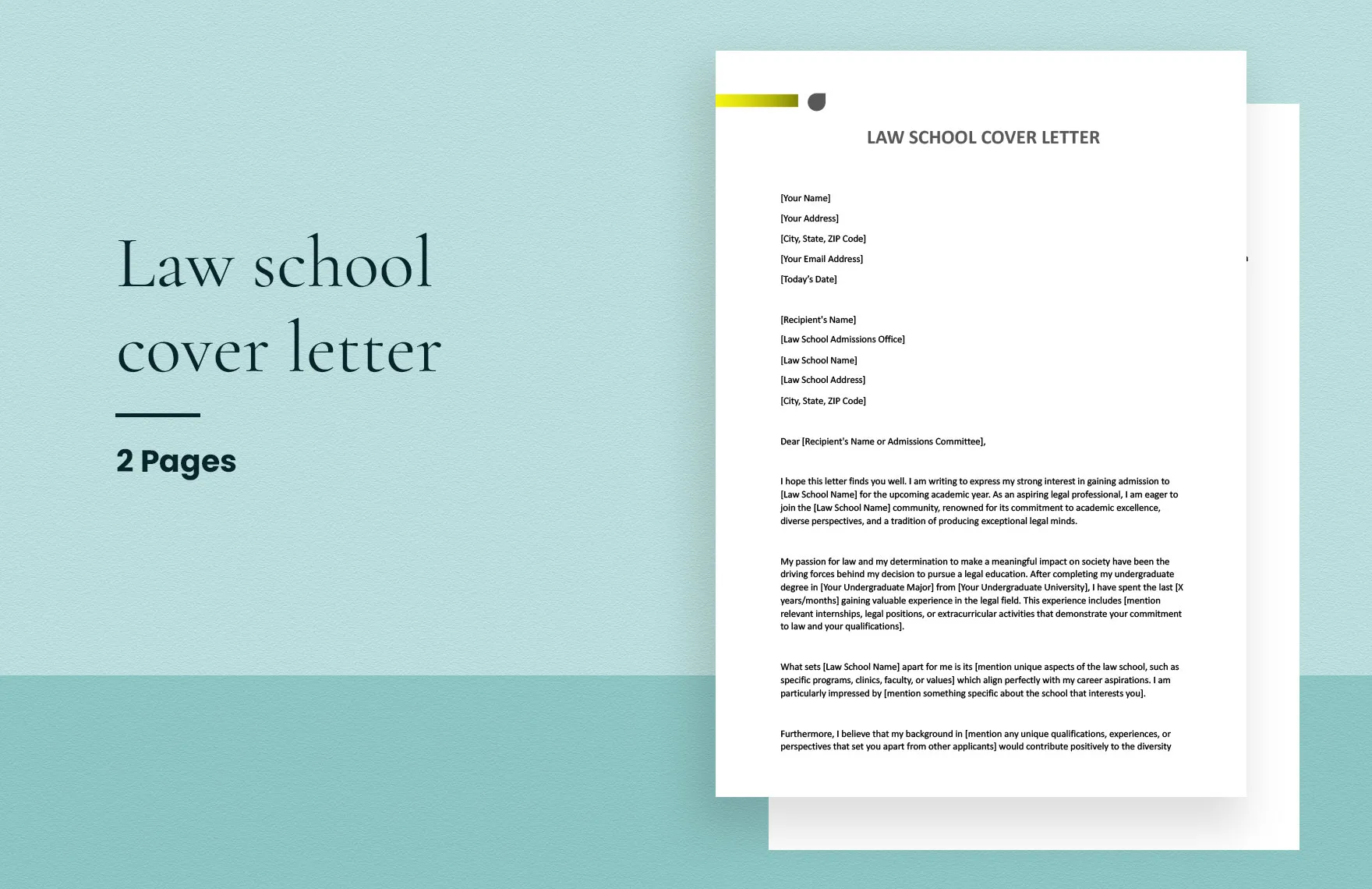
Demonstrating your fit with the law school is a crucial step, indicating that you’ve researched the institution and understand what makes it a good match for your ambitions. Explain why you’re interested in attending their particular law school. Reference specific programs, faculty members, research centers, or clinics that align with your interests and career goals. Express how you believe the school can help you achieve your aspirations. Explain your unique qualifications and how they can contribute to the law school community. Talk about specific opportunities that the school provides that resonate with you, and how they will contribute to your overall career path. Showcase how you will fit in with the culture of the law school. Demonstrate that you will be a valuable addition to the law school community by referencing the school’s values and the values you believe are essential for legal practice and law school success. The goal is to show the admissions committee that you are committed and have a clear vision for your legal education.
Expressing Your Interest in the Program
Expressing your interest in a law school’s specific programs is a key element of a compelling cover letter. Demonstrate that you’ve carefully considered what the school offers and how it aligns with your academic and career goals. Mention any specialized programs, clinics, or research centers that appeal to you. If you have specific areas of interest, such as environmental law, human rights, or intellectual property, highlight faculty members who are experts in those areas and explain how their work excites you. Discuss any unique opportunities the school provides, such as study abroad programs, journal publications, or moot court competitions. By referencing these details, you indicate your understanding of the school’s offerings and demonstrate your commitment. Your letter should show that you’re not just applying to any law school; you’re applying to this one, specifically, for very particular reasons.
Tip 4 Proofread Meticulously
Proofreading is a non-negotiable step in the application process. A cover letter riddled with errors can convey carelessness and a lack of attention to detail, which are not traits desired in aspiring lawyers. Proofread your cover letter multiple times. Start by reviewing it yourself, looking for grammatical errors, spelling mistakes, and punctuation issues. Read it aloud to catch any awkward phrasing or sentence structure issues. After your self-review, ask others to read your cover letter. A fresh pair of eyes can often identify mistakes that you might have missed. Ideally, have a professor, career counselor, or someone with strong writing skills review your letter and provide feedback. Using grammar and spell-checking tools is helpful, but don’t rely solely on them; they may not catch every error or stylistic issue. Ensure that the tone of your letter is professional and appropriate for the intended audience. Be meticulous and careful, as even minor errors can damage your application.
Ensuring Error-Free Content
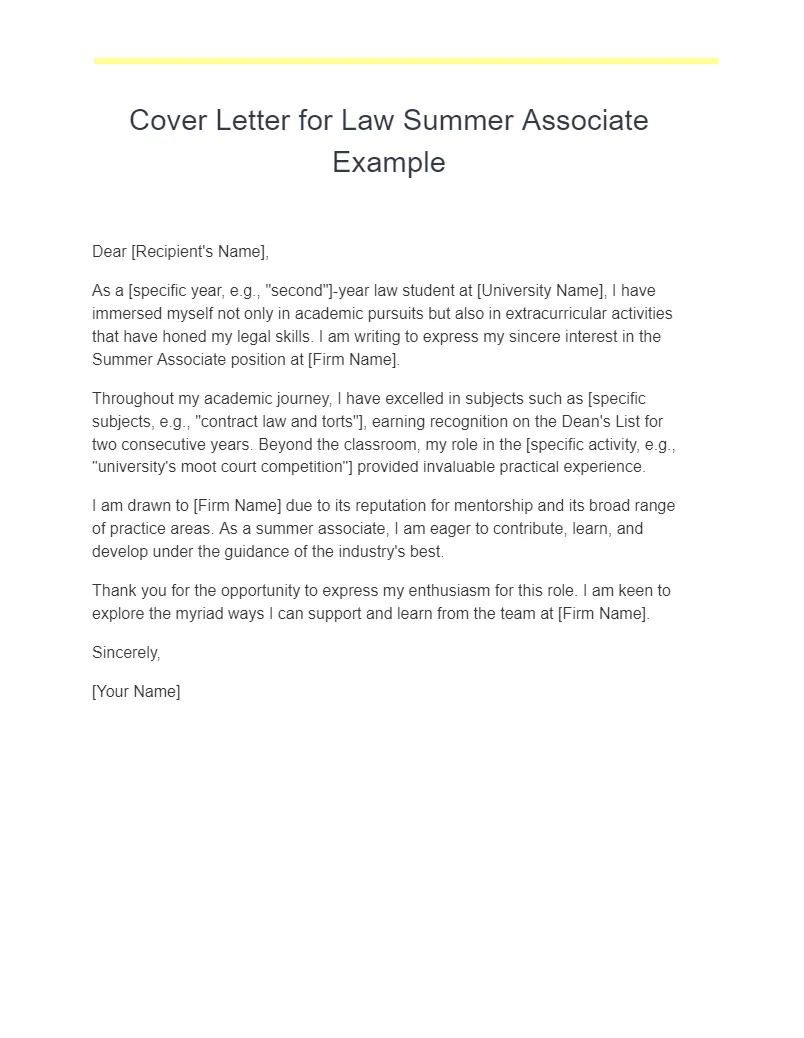
To ensure error-free content in your cover letter, you should use several different strategies to eliminate the risk of mistakes. Run your cover letter through a grammar and spell-checking software, as well as the word processor’s built-in tools, to identify any obvious errors. After these checks, read your letter carefully yourself, paying attention to each sentence and word. Then, have others proofread your letter. Ask friends, family members, professors, or career advisors to review your letter. When others read it, they are more likely to catch issues that you might have missed. Keep an eye out for consistency in formatting, font, and style throughout your letter. Finally, review the final version of your cover letter one last time before submitting your application to ensure you did not miss anything. The attention to detail demonstrated through a meticulously proofread cover letter can make the difference in your application.
Tip 5 Follow Instructions
Adhering to all application guidelines and instructions is absolutely essential. Carefully read the instructions provided by the law school regarding the cover letter. This includes requirements for length, formatting, and any specific questions or prompts that must be addressed. Pay close attention to the word or page limits. Submitting a cover letter that is too long or too short is an easy way to demonstrate a lack of attention to detail, a quality that admissions committees will not favor. Follow the formatting guidelines precisely. Use the specified font, font size, and margin settings. If the school requests that you include specific information or answer particular questions, make sure you address these points directly and completely. By meticulously following the instructions, you demonstrate that you are able to follow directions, a vital skill for the legal profession. Failing to follow instructions may lead to your application being rejected.
Adhering to Application Guidelines
To successfully adhere to application guidelines, start by thoroughly reviewing the application instructions. Read the instructions multiple times to make sure you understand all requirements. Pay close attention to any specific formatting guidelines. Many law schools have specific requests related to the content or the structure of the cover letter, so ensure you carefully follow all of these directives. Note any word or page limits, as failing to comply with these limits can reflect poorly on your application. Before submitting, double-check to make sure you have followed all the instructions. Ensure that you have included all required information and answered all the questions. Review the application form and the cover letter to ensure they align with the school’s guidelines. The more closely you follow the application guidelines, the higher your chances of success. By making an effort to completely follow instructions, you are showing that you pay attention to detail and that you are respectful of the school’s requirements.
Law School Cover Letter Examples Review
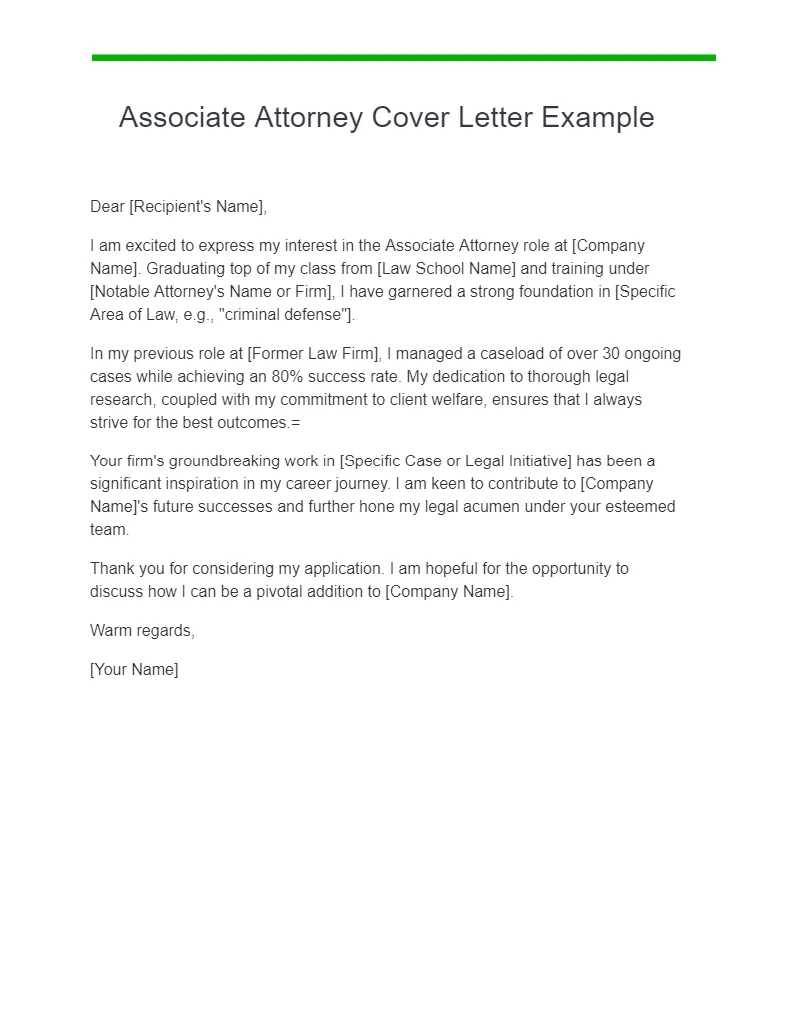
Reviewing law school cover letter examples can provide valuable insights into the structure, tone, and content that are effective for successful applications. Look for examples that are specific to the type of law school and program you are applying to, as this can help to ensure that your cover letter will resonate with the admissions committee. Pay attention to the format and organization of the cover letter. Note how the candidates introduce themselves, highlight their qualifications, and express their interest in the law school. Consider the language used in the examples. Identify the power words and phrases that are used to convey the candidate’s skills, qualities, and motivations. Adapt the content of the examples to make it relevant to your specific experience and goals. You can use the examples to get ideas about what to include in your own cover letter and avoid common mistakes. Remember that your cover letter should be unique and reflective of your experiences and aspirations.
